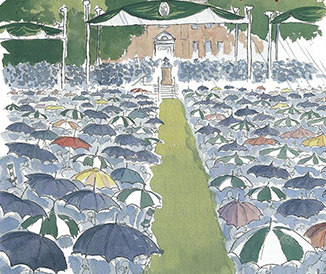Class Note 1962
In February, on Super Bowl Monday, “there was no joy in Mudville.” Pittsburgh, Pennsylvania, toiled on under cement skies and victory celebrations for the Steelers were canceled. Mildly dejected, I went to my computer to see what was happening in the rest of the world. I logged onto the class listserv and was greeted by a cry for help from our illustrious president, Gordy McKean, who was ostensibly “stranded in London” and in need of “urgent financial assistance.” Having roomed with Gordy as an undergraduate, I thought that this seemed plausible; he no doubt had made a bad bet on the losing team and had fled the country. However, the always-shrewd legal eagle Paul Weinberg posted cautionary advice: “Beware,” he said. “This falls in line with a well-known scam being perpetrated by people who somehow gain access to other people’s address books.” Ted Beal apparently did not get the memo. “I sent Gordy 500 bucks,” he wrote. Don Samuelson, more skeptical than Ted, sent Gordy a note saying that he himself was old and sick but had “access to millions of dollars that had been obtained by colleagues in Chicago politics.” If Gordy would send information on his bank account, Don would wire transfer him the funds plus a 20 percent commission for his trouble. This offer flushed Gordy out of exile post-haste, for he suddenly exploded upon the scene: “This is spam!” he cried, and—thanking everyone for their concern—put all rumors to rest. “We are healthy and fine,” he said, “and buried in snow in Ossining, New York.” His premature burial notwithstanding, Gordy did thaw out, for the snow soon melted and now—as Al Huck would say—“life is good” again and starting anew with the spring.
One sign of regeneration comes from Doug Skopp of Plattsburgh, New York, who has just published a novel, Shadows Walking (www.shadowswalking.com), on which he had been working for a very long time. Doug writes, “This book has been, in many ways, my life’s work, begun at Dartmouth while thinking about Germany and continued on through grad school and a nearly 40-year teaching career, the last 34 here at State University of New York.” Doug retired in 2006 from his post as distinguished university professor of history, but continues to serve on the faculty as college historian (he authored a centennial history of SUNY Plattsburgh in 1989) and as mentor in SUNY’s Institute for Ethics in Public Life. According to Doug, “Shadows Walking tells the story of Johann Brenner, an idealistic physician and ardent German nationalist, who has joined the Nazi Party and willingly participated in its crimes against humanity. His Jewish childhood friend Philipp Stein has also become a doctor. Their lives inevitably intersect until their last fateful meeting.” The novel reflects Doug’s ongoing interest in complex moral and ethical issues and can be purchased online from Amazon.com.
Incidentally, since we’re talking about writing, please send Kent Hutchinson your 50th reunion yearbook contribution if you haven’t already. It was due yesterday.
—Jim Haines, 307 Sewickley Ridge Drive, Sewickley, PA 15143; (412) 741-9088; jbhaines@comcast.net










